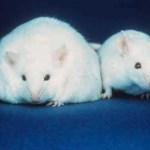leptin
I am very excited to report that the American Physiological Society in partnership with the The Physiological Society held a joint meeting from July 29-31 in Dublin, Ireland. The keynote lectures were given by Dr. Jerry Friedman from Rockefeller University and Dr. W Jon Lederer from the University of Maryland.
Dr. Friedman spoke about his research on obesity and how genetic factors might play a role. In fact, his team was responsible for discovering the obesity (ob) gene in mice in 1994 and identifying the similar gene in humans. The gene encodes the now iconic…
New research at the Institute sheds some light on a protein that could make it harder for overweight people to stick to a diet.
That protein helps regulate the effects of leptin - a hormone that reduces appetite and increases physical activity. People missing the leptin gene are invariably obese. It turns out, however, that this mutation is extremely rare; in fact, most chronically overweight people have too much leptin rather than too little. This happens because the body develops resistance to the hormone, so it amps up the signal, trying to be heard. It's also an indication that simply…
A recent paper provides the groundwork to establish a way for exercise to diminish appetite. Or, more likely, for sedentary behavior to increase appetite.
It is well known that exercise burns calories. Personally, I think that's overrated: Strength building raises your metabolic demand, and THAT burns calories. But that is not the main topic at hand. New research indicates that exercise also increases the sensitivity of neurons that are related to the control of the feeling of satiation. Therefore, you feel full rather than hungry sooner and/or more often.
In rodents. So far.
The…
